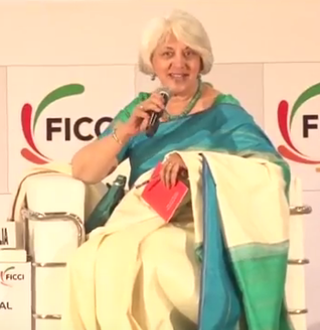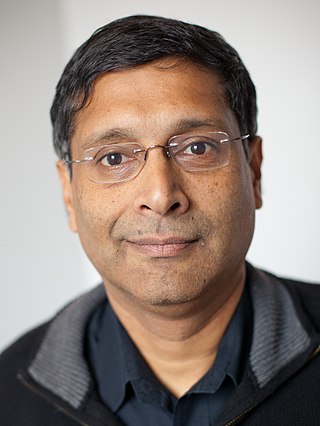
Signe Krogstrup (born 25 January 1972) is a Danish economist and one of the three governors of Danmarks Nationalbank, the Danish central bank. Previously she has worked for the Swiss National Bank and the International Monetary Fund.

Signe Krogstrup (born 25 January 1972) is a Danish economist and one of the three governors of Danmarks Nationalbank, the Danish central bank. Previously she has worked for the Swiss National Bank and the International Monetary Fund.
Signe Krogstrup holds a MSc in economics from the University of Copenhagen (1999) and a PhD in International Economics from the Graduate Institute of International and Development Studies in Switzerland (2003). [1]
In 2002–04, Krogstrup worked as an Associate Economic Affairs Officer for the UN-ESCWA in Beirut. In 2004–07, she worked at the Graduate Institute of International Studies in Geneva. She then joined the Swiss National Bank, first as adviser to the vice-governor (2008-2010) and then as a senior economist (2010–11) before in 2011 being appointed assistant director and deputy head of monetary policy analysis.
In 2012–13, Krogstrup served as an external expert on the Danish government's Committee on the Identification, Regulation, and Resolution of Systemically Important Financial Institutions in Denmark. From August 2015 to April 2016, on leave from the Swiss National Bank, she was a visiting fellow at the Peterson Institute for International Economics. [2] In 2015–19, she worked for the IMF in Washington, D.C. [1]
On 1 June 2019, Krogstrup assumed a position as Assistant Governor and Head of Economics and Monetary Policy at the Danish central bank Danmarks Nationalbank. In November 2020 she succeeded Hugo Frey Jensen as one of the three members of Danmarks Nationalbank's Board of Governors. [3] [4]
Krogstrup is married and has two children (born 2005 and 2008). [1]

Ewald Nowotny is an Austrian economist and social democratic politician and former governor of Austria's central bank Oesterreichische Nationalbank. He was also a member of the European Central Bank’s governing council.

Danmarks Nationalbank is the central bank of the Kingdom of Denmark. It is a non-eurozone member of the European System of Central Banks (ESCB). Since its establishment in 1818, the objective of the Nationalbank as an independent and credible institution is to issue the Danish currency, the krone, and ensure its stability. The Board of Governors holds full responsibility for the monetary policy.

Axel Alfred Weber is a German economist, professor, and banker. He is currently a board member and chairman of Swiss investment bank and financial services company, UBS Group AG, and has announced his resignation effective 7 April 2022.
Otmar Issing is a German economist who served as a member of the Executive Board of the European Central Bank from 1998 to 2006 and concurrently as ECB chief economist. He developed the 'two-pillar' approach to monetary policy decision-making that the ECB has adopted. After leaving the executive board, Issing been serving as president of the Center for Financial Studies since 2006.

Maurice Moses "Maury" Obstfeld is a professor of economics at the University of California, Berkeley and previously Chief Economist at the International Monetary Fund. He is also a nonresident senior fellow at the Peterson Institute for International Economics.

Isher Judge Ahluwalia was an Indian economist, public policy researcher, and professor. She was Chairperson Emeritus, Board of Governors, at the Indian Council for Research on International Economic Relations (ICRIER). She had also served as the chairperson of the board of the International Food Policy Research Institute, and the chairperson of the Government of India's High-Powered Committee on Urban Infrastructure Services. She was awarded India's 3rd highest civilian award, Padma Bhushan, in 2009.
Birgit Grodal, was an economics professor at the University of Copenhagen from 1968 until her death in 2004.

José De Gregorio Rebeco is a Chilean economist, academic, researcher, consultant and politician. He has been the Governor of the Central Bank of Chile, Minister of the Economy, Mining and Energy during the administration of Ricardo Lagos and is currently the Dean of the School of Economics and Business of the Universidad de Chile. He is also a nonresident Senior Fellow at the Peterson Institute for International Economics.
The Bernacer Prize is awarded annually to European young economists who have made outstanding contributions in the fields of macroeconomics and finance. The prize is named after Germán Bernácer, an early Spanish macroeconomist.
Philip Richard Lane is an Irish economist who has been serving as a member of the Executive Board of the European Central Bank since 2019 and concurrently as ECB chief economist. He previously served as Governor of the Central Bank of Ireland from 2015 to 2019. As ECB Chief Economist, Lane is seen by many as providing an academic counterweight to the traditional political abilities of ECB President, Christine Lagarde.

Beatrice Weder di Mauro is a Swiss economist who is currently Professor of economics at the Graduate Institute of International and Development Studies in Geneva, Research Professor and Distinguished Fellow-in-residence at the Emerging Markets Institute of INSEAD Singapore, and senior fellow at the Asian Bureau of Finance and Economic Research (ABFER). Since 2018, she also serves as President of the Centre for Economic Policy Research (CEPR).

Arvind Subramanian is an Indian economist and the former Chief Economic Advisor to the Government of India, having served from 16 October 2014 to 20 June 2018. Subramanian is currently a Senior Fellow at the Watson Institute for International and Public Affairs at Brown University. He previously served as Professor of Economics at Ashoka University and a Senior Fellow at the Peterson Institute for International Economics and Center for Global Development.
Ugo Panizza is an Italian and Swiss economist. He is a professor of International Economics, department head, and Pictet Chair in Finance and Development at the Graduate Institute of International and Development Studies in Geneva. He is a vice-president of the Centre for Economic Policy Research (CEPR), the director of the International Center for Monetary and Banking Studies, the editor in Chief of Oxford Open Economics and International Development Policy, and the deputy director of the Centre for Finance and Development. He is a members of the Scientific Committees of the Fondazione Luigi Einaudi (Torino) and Long-term Investors@UniTo.
Simon Wren-Lewis is a British economist. He is a professor of economic policy at the Blavatnik School of Government at Oxford University and a Fellow of Merton College.
Charles Wyplosz is a French economist. He is an editor of the International Centre for Economic Policy Research's VoxEU and is currently the director of the International Centre for Monetary and Banking Studies (ICMB) and Professor of International Economics at the Graduate Institute in Geneva, Switzerland. He was a founding managing editor of Economic Policy.
The European banking union refers to the transfer of responsibility for banking policy from the member state-level to the union-wide level in several EU member states, initiated in 2012 as a response to the 2009 Eurozone crisis. The motivation for the banking union was the fragility of numerous banks in the Eurozone, and the identification of a vicious circle between credit conditions for these banks and the sovereign credit of their respective home countries. In several countries, private debts arising from a property bubble were transferred to the respective sovereign as a result of banking system bailouts and government responses to slowing economies post-bubble. Conversely, weakness in sovereign credit resulted in deterioration of the balance sheet position of the banking sector, not least because of high domestic sovereign exposures of the banks.

Karen Dynan is an American economist who is Professor of the Practice of Economics at Harvard University and a Non-resident Senior Fellow at the Peterson Institute for International Economics. She previously served as the Assistant Secretary of the Treasury for Economic Policy and Chief Economist of the United States Department of the Treasury, having been nominated to that position by President Barack Obama in August 2013 and confirmed by the U.S. Senate in June 2014. From 2009 to 2013, Dr. Dynan was the Vice President and Co-director of the Economic Studies program at the Brookings Institution. Prior to joining Brookings, she served on the staff of the Federal Reserve Board for 17 years. Dr. Dynan is an expert on macroeconomic policy, consumer behavior, household finance, and housing policy.

Lucrezia Reichlin is an Italian economist who has been a professor at London Business School since 2008.

Robert Holzmann is an Austrian economist and the current Governor of Austria’s central bank, the Oesterreichische Nationalbank (OeNB). His term of appointment runs from September 1, 2019, to August 31, 2025.
Monika Schnitzer is a German economist and chair of comparative economic research at the Ludwig Maximilian University of Munich. She was the president of the Verein für Socialpolitik from 2015 to 2016 and is the chairwoman of the German Council of Economic Experts since 2022.